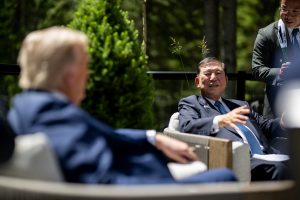Canada’s conservatives were gearing up to sweep the country’s federal election in April.
Then, Donald Trump began his second term in office.
Just days later, he imposed a 25 percent blanket tariff on Ottawa while musing about making Canada the 51st state. Analysts watched in shock as the Liberal Party surged in polls as Canadian voters punished Conservative leader Pierre Poilievre for his association with Trump, dubbed the “Trump Effect.”
The Liberals dominated the April election. Poilievre lost his seat.
And, ultimately, Trump lost out on a Trump-friendly right-of-center government in Ottawa.
Echoing across the Pacific, Trump has backed Japan’s ruling conservative Liberal Democratic Party (LDP) into a similar corner, through a combination of careless rhetoric and tariff policy.
Just a few months into his second term, Trump has repeatedly questioned the United States’ treaty obligation to defend Japan in the event of a foreign attack, at a time when threats from Japan’s immediate neighbors — Russia, China, and North Korea — continue to grow.
The Japanese public has not taken those comments lightly. A poll from Japan’s Yomiuri Shimbun last week found that only 22 percent of respondents trusted the U.S., a sharp drop from polling in 2024.
On trade, Trump has placed Japan’s already-unpopular Ishiba Shigeru cabinet into an impossible situation. Cars and rice have emerged as the main sticking points for U.S. negotiators after several rounds of trade talks. Trump and his allies have repeatedly promoted falsehoods about Japan’s policies on both goods, including a nonexistent 700 percent rice tariff and an imaginary ”bowling ball test” for automobiles.
Domestically, the economic and political consequences of acquiescence on the car and rice industries could be dire for Ishiba and the LDP. Vehicles are Japan’s primary export — and the U.S. is its top customer. Changes to rice import policy could shake Japan’s powerful agriculture lobby, a critical constituency of the ruling LDP. Japanese voters, unnerved by Trump’s rhetoric and behavior, overwhelmingly support the Japanese government refusing to concede to U.S. demands.
However, despite Japanese negotiators continuing to press for a favorable deal for Tokyo, a failure to do so may draw significant ire from Japanese voters who already have low faith in the Ishiba cabinet’s minority government.
Last week, Trump fired off a new round of threats against Tokyo over a span of several days, once again decrying Japan’s car and rice trade policies and ultimately threatening to increase tariffs on the country if a deal wasn’t reached by Trump’s global July 9th trade deal deadline.
This week, Trump sent a letter to Tokyo formalizing a tariff increase scheduled for August 1, just two weeks after Japan’s upcoming elections.
As in Canada, Trump is potentially sabotaging the success of a political party that has traditionally been an ally. The LDP’s former and longtime leader, Abe Shinzo, notably enjoyed a close friendship with Trump during his first term.
Additionally, Japan’s LDP is leading the charge to increase the country’s defense spending, one of Trump’s primary goals for U.S. allies across the board, most recently pressing for a 5 percent benchmark among NATO countries.
The Trump administration has been especially aggressive in pursuing a similar defense spending increase in Japan. So much so that the demands have repeatedly leaked into trade negotiations, to the public annoyance of Ishiba himself. In June, the Financial Times reported that the U.S. increased its demands for Japanese defense spending from an already unrealistic 3 percent to 3.5 percent, prompting Japan to cancel a scheduled 2+2 meeting.
It is decidedly outside the Trump administration’s interest to harm the LDP’s electoral prospects if it wants a greater chance at achieving its goals for Japanese defense spending. Nor can Trump be taken seriously on standing against China if he chooses to sacrifice the U.S.-Japan security relationship over rice.
The most productive off-ramp would be for U.S. trade negotiators to back down and promptly sign a good-faith, favorable trade deal for Tokyo, allowing the Ishiba cabinet to deliver a major win before Japanese voters go to the polls. The Japanese government can not electorally afford to acquiesce to a harmful deal, nor weather a tariff increase.
Ultimately, only Trump can stop the Trump Effect.

































